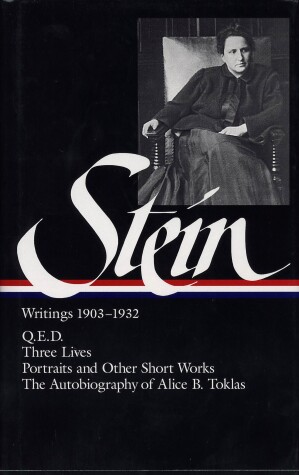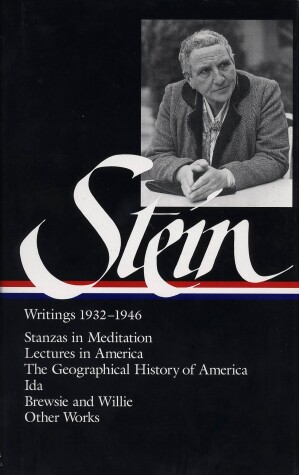Library of America Gertrude Stein Edition
2 primary works
Book 1
This Library of America volume, along with its companion, surveys a literary trajectory that from the beginning of the 20th century to the end of World War II marked Gertrude Stein as a fearless and uncompromising experimenter. She was also a master of anecdote and aphorism, many of whose phrases—from “rose is a rose is a rose” to “there is no there there” and “when this you see remember me”—have passed into the language.
This first volume, containing works written between 1903 and 1932, takes Stein from her first, more traditional fictional works to the exuberant and astonishing experiments of the early Paris years. She was a devoted student of William James, with whom she studied psychology at Radcliffe in the 1890s, and took an early interest in memory and the function of repetition in human character. In her early works, she sought a new kind of realism exemplified here by Q.E.D. (written 1903, published posthumously), a novel about lesbian entanglements at college, and the modern classic Three Lives (1909), a set of novellas about the lives of three ordinary women, described in the simplest and most direct of prose.
In her brilliant abstract “portraits” Stein uses an extraordinary array of verbal techniques to evoke those friends and collaborators—Matisse, Picasso, Apollinaire, Juan Gris, Satie, Mabel Dodge, Carl Van Vechten, Sherwood Anderson, Virgil Thomson—with whom she shared decades of revolutionary ferment in the arts. Her play Four Saints in Three Acts (1927), which became the basis for an opera by Virgil Thomson, is written for a freewheeling theater of the mind where everything becomes possible. In “Lifting Belly” and other works she joyously celebrates her lifelong relationship with Alice B. Toklas, one of the most famous domestic partnerships of that century. The Autobiography of Alice B. Toklas (1933), Stein’s oblique and playful memoir, became an immediate bestseller and sealed Stein’s international celebrity.
LIBRARY OF AMERICA is an independent nonprofit cultural organization founded in 1979 to preserve our nation’s literary heritage by publishing, and keeping permanently in print, America’s best and most significant writing. The Library of America series includes more than 300 volumes to date, authoritative editions that average 1,000 pages in length, feature cloth covers, sewn bindings, and ribbon markers, and are printed on premium acid-free paper that will last for centuries.
This first volume, containing works written between 1903 and 1932, takes Stein from her first, more traditional fictional works to the exuberant and astonishing experiments of the early Paris years. She was a devoted student of William James, with whom she studied psychology at Radcliffe in the 1890s, and took an early interest in memory and the function of repetition in human character. In her early works, she sought a new kind of realism exemplified here by Q.E.D. (written 1903, published posthumously), a novel about lesbian entanglements at college, and the modern classic Three Lives (1909), a set of novellas about the lives of three ordinary women, described in the simplest and most direct of prose.
In her brilliant abstract “portraits” Stein uses an extraordinary array of verbal techniques to evoke those friends and collaborators—Matisse, Picasso, Apollinaire, Juan Gris, Satie, Mabel Dodge, Carl Van Vechten, Sherwood Anderson, Virgil Thomson—with whom she shared decades of revolutionary ferment in the arts. Her play Four Saints in Three Acts (1927), which became the basis for an opera by Virgil Thomson, is written for a freewheeling theater of the mind where everything becomes possible. In “Lifting Belly” and other works she joyously celebrates her lifelong relationship with Alice B. Toklas, one of the most famous domestic partnerships of that century. The Autobiography of Alice B. Toklas (1933), Stein’s oblique and playful memoir, became an immediate bestseller and sealed Stein’s international celebrity.
LIBRARY OF AMERICA is an independent nonprofit cultural organization founded in 1979 to preserve our nation’s literary heritage by publishing, and keeping permanently in print, America’s best and most significant writing. The Library of America series includes more than 300 volumes to date, authoritative editions that average 1,000 pages in length, feature cloth covers, sewn bindings, and ribbon markers, and are printed on premium acid-free paper that will last for centuries.
Book 2
This Library of America volume, along with its companion, presents a full-scale gathering of the achievement of Gertrude Stein, the most radical innovator in twentieth-century literature.
This second volume includes works written between 1932 and her death in 1946, years in which she gained a wider readership and made a triumphant return to the United States as a lecturer, but chose ultimately to remain in France during World War II. It opens with the poetic sequence Stanzas in Meditation (complete text published posthumously in 1946), perhaps Stein’s most austere and rigorous experiment in linguistic abstraction. In Lectures in America (1935) and The Geographical History of America (1936), she made the most of her newfound status as a public figure, exploring with brilliance and humor the philosophical implications of her writings, the difference between English and American literature, the importance of space in American culture, and much else. Picasso (1938) is a book-length study of the painter who was one of her closest associates, and whose work was a lifelong inspiration for her.
Stein’s playfulness is given full scope in the children’s book The World is Round (1939) and in Ida (1941), an enchanting exercise in pure verbal invention. The plays Doctor Faustus Lights the Lights (written 1938, published 1949) and The Mother of Us All (1947), inspired by the life of women’s rights activist Susan B. Anthony, give new twists to legendary and historical figures, while “Three Sisters Who Are Not Sisters” (1946) pays tribute to the melodramas that delighted Stein in her childhood. In her last major work, Brewsie and Willie (1946), a striking stylistic departure, she pays homage to the American soldiers she came to know after the liberation of France with a remarkable evocation of their speech and aspirations.
LIBRARY OF AMERICA is an independent nonprofit cultural organization founded in 1979 to preserve our nation’s literary heritage by publishing, and keeping permanently in print, America’s best and most significant writing. The Library of America series includes more than 300 volumes to date, authoritative editions that average 1,000 pages in length, feature cloth covers, sewn bindings, and ribbon markers, and are printed on premium acid-free paper that will last for centuries.
This second volume includes works written between 1932 and her death in 1946, years in which she gained a wider readership and made a triumphant return to the United States as a lecturer, but chose ultimately to remain in France during World War II. It opens with the poetic sequence Stanzas in Meditation (complete text published posthumously in 1946), perhaps Stein’s most austere and rigorous experiment in linguistic abstraction. In Lectures in America (1935) and The Geographical History of America (1936), she made the most of her newfound status as a public figure, exploring with brilliance and humor the philosophical implications of her writings, the difference between English and American literature, the importance of space in American culture, and much else. Picasso (1938) is a book-length study of the painter who was one of her closest associates, and whose work was a lifelong inspiration for her.
Stein’s playfulness is given full scope in the children’s book The World is Round (1939) and in Ida (1941), an enchanting exercise in pure verbal invention. The plays Doctor Faustus Lights the Lights (written 1938, published 1949) and The Mother of Us All (1947), inspired by the life of women’s rights activist Susan B. Anthony, give new twists to legendary and historical figures, while “Three Sisters Who Are Not Sisters” (1946) pays tribute to the melodramas that delighted Stein in her childhood. In her last major work, Brewsie and Willie (1946), a striking stylistic departure, she pays homage to the American soldiers she came to know after the liberation of France with a remarkable evocation of their speech and aspirations.
LIBRARY OF AMERICA is an independent nonprofit cultural organization founded in 1979 to preserve our nation’s literary heritage by publishing, and keeping permanently in print, America’s best and most significant writing. The Library of America series includes more than 300 volumes to date, authoritative editions that average 1,000 pages in length, feature cloth covers, sewn bindings, and ribbon markers, and are printed on premium acid-free paper that will last for centuries.

